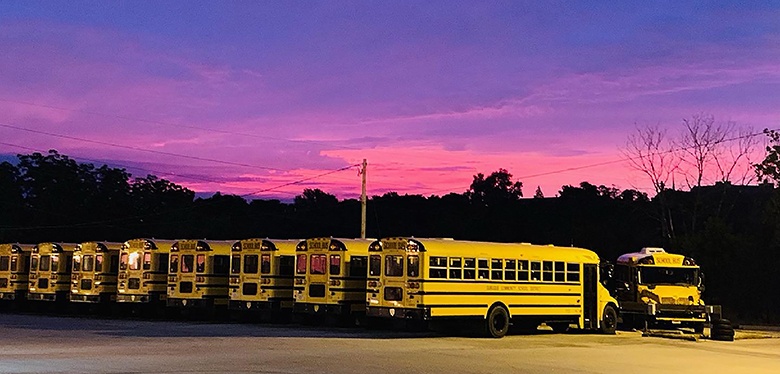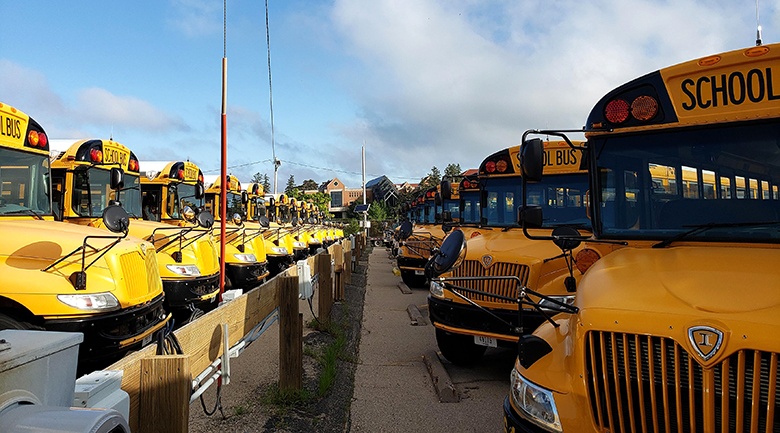
Dubuque Community Schools provides transportation for one of the largest districts in Iowa. Of the 6,000 students riding 86 buses, about one third of the district’s routes accommodate special needs students, giving Dubuque Community Schools one of the highest concentrations of special needs services in the state. With so many moving parts, day in and day out, the use of technology to plan routes and track vehicles has become imperative for the district’s transportation department.
“About 28 of our approximately 70 routes are for students with special needs,” said Ernie Bolibaugh, transportation manager for Dubuque Community Schools. “With a double-tier system that splits elementary-aged kids from those in high school and middle school, it would be impossible to plan our transportation without using a robust system.”
Between route planning, driver changes, McKinney-Vento considerations, and route changes associated with special needs, Dubuque Community Schools has benefited from its longtime partnership with Tyler Technologies and utilizing Tyler’s transportation management solutions.
Migration to the Cloud
Dubuque Community Schools’ transportation department is a longtime user of the Versatrans route planning solution by Tyler Technologies. Beginning in the summer of 2021, the district began the transition from Versatrans to Tyler’s web-based Student Transportation software, previously known as Traversa.
The district had been using Versatrans for route and bus planning, driver directions, and managing student loads, as well as storing information related to individual students’ transportation requirements. Versatrans was highly effective at implementing the district’s safety rules and policies directly in the map used by the software such as actual speeds the buses traveled on roads, turn restrictions and walk restrictions.
However, Bolibaugh said, the Versatrans system required extra server space, secure access, and needed to interface with other district systems and processes. When the transportation department heard about the opportunity to upgrade to Student Transportation, powered by Traversa, Tyler was keen to showcase the numerous advantages of this web-based routing solution.
“From an accessibility standpoint, migrating to the web-based system had many advantages,” Bolibaugh said. “We weren’t unhappy with Versatrans, but we were intrigued about having more via the Internet. With Student Transportation, I can pull up routing plans from home or in my service vehicle, or from any school in the district. That 24/7 access was one of the biggest deciding factors in our move to Student Transportation.”
An All-in-One Solution
In addition to its cloud connection, Tyler’s Student Transportation software is capable of tracking fleet maintenance, activity trips, and parent communications. Tyler’s goal was to reduce the district’s number of siloed systems, and their Student Transportation software manages this by providing routing, student information, data management, mapping, resource management, GPS/AVL integration, maintenance, dispatch, and parent information – all in one solution.
Routing – The system allows for multiple views, out-of-district routing, and realistic stop locations. Each student has a record within the platform, outlining their unique information and any specialized requirements. For run building, Student Transportation keeps track of the district’s unique requirements and data, and can automate “optimized runs” from which Dubuque Community Schools can build efficient routes. Runs can also be geolocated via smartphone.
“Without technology like Student Transportation, it would be impossible to plan all this stuff,” Bolibaugh said. “I have been around long enough to know how to route buses with yarns and pins – but that’s not a good way to do it anymore, especially with the double-tier system and the push for fleet efficiency.”
Transportation management – Student Transportation’s Advanced Trips module allows for complex trip planning, including assigning different drivers to different sections of a trip. The software keeps track of time and mileage for each driver. Furthermore, the system’s fleet maintenance interface keeps track of work orders, parts inventory, and preventive maintenance scheduling.
“Some routes are changing continuously, especially with so many special needs students,” Bolibaugh said. “Also, we are seeing more and more homeless students under McKinney-Vento. We have several requests every week to try to take care of and meet the needs of unhoused families.”
Dispatch – In addition to robust student and resource management tools, the Electronic Rollout Sheet (ERS) feature electronically tracks on-time departures, driver absences, and trip delays – all with the goal of making dispatch decisions faster and more intuitive.
“Whether a student has a health record or if alternate transportation stops between families, all that information is stored and updated live in the system,” Bolibaugh said. “Instead of paperwork, that student record is stored directly in Student Transportation.”
“We’re pleased that Dubuque is interested in using Student Transportation as a full package,” said Jennifer Dinsmore, senior implementation consultant with Tyler Technologies. Dinsmore was Dubuque’s assigned implementation consultant and helped the district through its onboarding process. “With the features that they’ve utilized – including the My Ride K-12 app for parents and students, advanced automatic vehicle location (Advanced AVL) based on GPS data, and ERS to track drivers – it’s clear that they’re making this software a ‘one-stop shop’ for their transportation needs.”

Implementation and Training
When Dubuque Community Schools opted to migrate from Versatrans, Tyler Technologies’ migration team began assisting with data cleanup. This process involved reviewing all the data stored in the Versatrans platform, and working with the district to determine which data sets would be useful in Student Transportation.
After cleaning out the older data, the migration team began pulling useful data from Versatrans into the new software.
“The transportation team at Dubuque worked hand-in-hand with Tyler Technologies on data cleanup, identifying any shortcomings and working hard to clean up any old or deficient information,” Dinsmore said. “At the end of the day, they were focused on the big prize of a successful [software] migration. They took on this task in addition to their daily transportation responsibilities and performed excellently.”
Sandra Power, the software implementation manager for Tyler, said the implementation process is custom-tailored and unique for each district – dependent on district size, special requirements, and whether the district is already utilizing Tyler’s other solutions.
“Every district’s situation is different, and we have an entire team at Tyler dedicated to working with customers and determining how they can best move from Versatrans to their new transportation platform,” Power said. “Some districts have high turnover in staff, in which case it’s our job to empower those new employees as well as those who don’t consider themselves tech-savvy. We work with the district, gather relevant data elements, and build the cloud-based software side-by-side with our customer.”
“Other districts might be a long-term Tyler customer,” she continued. “They love Versatrans, but they want to move to the cutting-edge cloud system. We educate those districts – like Dubuque – to learn the new software and associated technology. The entire process comes down to listening to our customers, understanding their needs, and understanding their data.”
“Training”, Power said, “is not one-size-fits-all. Because Student Transportation is a new system to the district, training is always required regardless of the district or contractor. However, training is also tailored to fit a district’s own needs, data, and trip scenarios.”
“We received a lot of online training, which was not bad at all because it was happening during COVID,” Bolibaugh said. “Our dedicated trainer worked with our staff to pick up all the new features. It’s really been a process of forgetting old habits and learning new ones, as we move from Versatrans to Student Transportation.”
Cloud Access Means Accessibility
Because Tyler’s Student Transportation platform is a software-as-a-service (SaaS) technology, Dubuque Community Schools no longer need to own, update, or maintain on-site hardware and servers.
This also means that Tyler can automatically and simultaneously push out system updates, bug fixes, and new features without troubling the district for hardware access.
“The updates come out pretty frequently,” Bolibaugh said. “If someone comes up with a plan, it can be implemented much more quickly than if we had the old system on an annual or quarterly update schedule. Changes are available more quickly between users as well. With one entry stroke on Student Transportation, any changes are available and accessible to everyone in our operation. That has been a big plus.”
Bolibaugh said that the increased accessibility lets the system replace numerous paper records, including special trip requirements for individual students. Whereas those records were once kept on a shelf near dispatch, they are now stored directly in the software and accessible from any authenticated device.
Education tools within the software not only notify users about new updates but also detail the changes made with each update.
“With everything being web based, the system really opens up new abilities for users,” Dinsmore said. “If the bus garage wants to use fleet maintenance features of Student Transportation, administrators can quickly create logins for that group and give them access to just the maintenance software. The district can really have a handle on which user is accessing the software, and which parts Student Transportation are accessible to that user.”
Moving Forward
Bolibaugh said that Dubuque Community Schools are working to deploy Tyler’s My Ride K-12 app, where parents and students can access bus stop locations, route information, pick-up times, and more. The secure app works on desktop or mobile devices and fully integrates with GPS to provide dynamic schedules.
The district is also testing out Tyler Drive, a tablet-based system which provides drivers with turn-by-turn directions and ETAs, as well as managing student ridership, employee timekeeping, and pre- and post-trip vehicle inspections.
“We’ve had one test program with the Tyler Drive tablets at one of our elementary schools and we’re pretty happy with how they were able to keep track students and trip information. So, we are moving forward with full implementation of Tyler Drive, which will add more information for parents in the My Ride K-12 app. They can see where and when their kids got on and off a bus, and the exact location of any dropoff. It’s a big step forward for our district, but we are eager because of the visibility and safety benefits for our students.”
Dinsmore said that Dubuque Community Schools provides a stellar model for other districts looking to upgrade technology without sacrificing any daily tasks or responsibilities.
“I don’t know if people outside of student transportation understand the heart and dedication of teams like those at Dubuque Community Schools,” she said. “They really wanted to get this implementation done correctly, so that the system could start benefitting the community. Dubuque is a great example of that dedication.”


